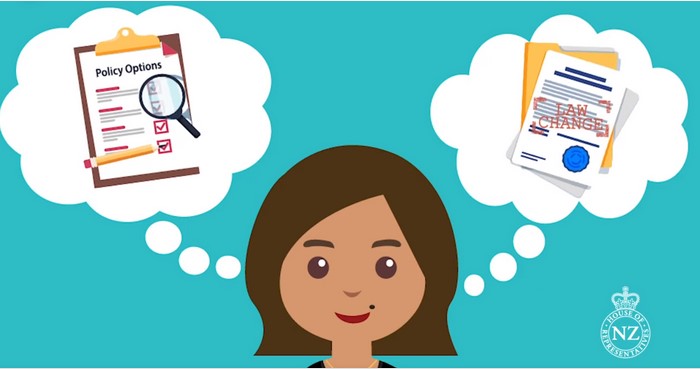Policy options and law changes are among what New Zealanders can have their say on through referendums.
Source: Parliamentary Service
What is a referendum?
A referendum is a vote on a question. Referendums usually have a “yes” or “no” answer, but can have more than two possible answers. Referendums can be held with an election, in a stand-alone poll, or by postal vote.
There are two types of referendums in New Zealand—government-initiated, and citizens-initiated.
Government-initiated referendum
These are referendums promoted by the Government. They can be used to bring legislation into law, or to gauge how the public feel on a particular issue. These referendums can be non-binding, or binding (which means that the Government has to act on the final result).
Citizens-initiated referendum
Any New Zealand citizen can petition for a referendum, known as a ‘citizens initiated referendum’. For one of these to be held, at least ten percent of eligible voters must sign a petition supporting the proposed referendum question. For context, there were 3.5 million people enrolled to vote at the 2020 election.
These referendums are non-binding, which means the Government doesn’t have to act on the result of it. Under New Zealand law, non-binding referendums can be held on any subject.
There have been a number of citizens-initiated referendums held, although only a few have caused changes to occur. Some referendums have been on:
- Should the number of professional firefighters employed full time in the New Zealand Fire Service be reduced below the number employed on 1 January 1995?
- Should a smack as part of good parental correction be a criminal offence in New Zealand?
- Should the size of the House of Representatives should be reduced from 120 members to 99 members?
How does a citizens-initiated referendum work?
- A person submits a proposal to the Clerk of the House of Representatives asking them to promote a referendum petition.
- The Clerk advertises the proposed question, which gives the public the chance to have their say on the wording of it. This can take up to three months.
- The Clerk decides the question’s final wording and approves the form for the collection of signatures.
- The petitioner has 12 months to gather enough signatures (at least ten percent of eligible voters) supporting the question, and then deliver the petition to the Clerk.
- If the petition is compliant, the Speaker presents the petition to the House of Representatives. If there aren’t enough signatures the petition will lapse (although the petitioner can resubmit the petition if they gather the remaining number of signatures within two months).
- The Governor-General sets a date for the referendum within a month from the date the petition was presented. It must be held within a year of the presentation date unless 75 percent of MPs agree to defer it.
- The referendum is held and the result is declared.
To see what citizens-initiated referendums are currently in process, click here.
What issues have New Zealanders had their say on through referendums?
New Zealand’s first referendum
In the 19th and early 20th century, no topic got New Zealanders more fired up than alcohol. Politicians were plagued with arguments from both sides of the debate, while the temperance movement (which aimed to limit the drinking of alcohol) held a lot of political sway.
Four referendums were held between 1894 and 1908 on liquor licenses, but these were not “national” referendums as people could only have their say on licenses in their own areas.
This changed in 1911, with New Zealand’s first nationwide referendum asking voters to choose between national continuance or prohibition of alcohol sales. It wasn’t the last though—by the end of the 20th century, two-thirds of the referendums held had been about alcohol.
Flag referendums
Over 2015 and 2016, New Zealand held a two-stage consultative referendum on the New Zealand flag. The first referendum asked voters to rank five alternative flag designs from a shortlist of 40, which had been narrowed from over 10,000 designs submitted by New Zealanders. In the 2016 referendum, voters chose to keep the current flag instead of adopting the preferred alternative option.
This type of referendum is known as “consultative”, as it is used by the Government to gauge the public mood on a particular topic. Others have included:
- if hotel bars should be able to stay open for longer (1949 and 1967)
- if military training should be compulsory (1949)
- if a compulsory retirement scheme should be introduced (1997)
2020 referendums
New Zealand’s most recent referendums were the two held alongside the 2020 general election on the End of Life Choice Act 2019 (which had a successful “yes” vote of 65.1 percent), and the legalisation of recreational cannabis use (which had a “yes” vote of 48.4 percent, and so was not successful).
The End of Life Choice Act 2019 gives people with a terminal illness the option of requesting assisted dying, if two doctors agree the person has less than six months to live. Parliament passed the End of Life Choice Act 2019, but needed a positive referendum result to come into force – which it will do on 6 November 2021 (a year after the date the final votes were announced).
The cannabis referendum asked whether people agreed with the draft Cannabis Legalisation and Control Bill, which outlined a proposed law for legalising and controlling cannabis for recreational use. The “yes” vote did not reach the 50 percent threshold and Government members have indicated that they intend to honour the outcome of the referendum. The normal process for changing New Zealand law would have still applied if the referendum had a positive result.



